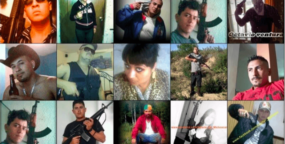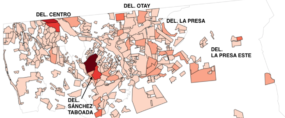Posted on 20 Dec 2015
A silver Mercedes-Benz pulls into the driveway of a luxury beachfront home on Maputo’s Avenida Marginal. As an electronic security gate begins to close behind the car, four men loitering in the street break into a run. One slips past the gate, then another. An old Ford Grenada pulls up outside. Seconds later, the driver of the Mercedes, Hariche Arquissandas, is hustled at gunpoint into the Ford. One of the men kicks him as he struggles to break free. Witnesses hear a gunshot ring out. The Grenada speeds off in the direction of the ocean and makes a sharp left turn onto the Maputo ring road.
Captured by a security camera (in video below), the footage is posted online and quickly goes viral; the latest in a mounting string of kidnappings for ransom and killings that have terrorised Mozambique’s business community in recent years.
It is impossible to say for certain how many people have been kidnapped. In many instances the crimes go unreported. Data gathered by a private risk management consultancy, Rhula Intelligent Solutions, suggests that at least 95 people have been kidnapped for ransom in the Mozambican capital and Matola, Beira and Nampula since 2011. The bulk of kidnappings in 2014 and 2015 have been carried out in broad daylight, many of them targeting the children of wealthy businessmen. In most cases the victims are released unharmed after money is paid. Police freed Arquissandas – the managing director of the Hariche Group of companies – eight days later. His kidnappers escaped. Two weeks later police announced they had arrested the owner of the getaway car.
Lives have been lost. In October this year, a bystander was killed and two people – including a security guard – were wounded in a gun battle that erupted after an abortive attempt by four kidnappers to abduct the son of an electronic goods shop owner. The target, Ashu Abdul Aziz (24), escaped unharmed. It was the second time Aziz had been targeted. In 2013, he was abducted, held for several days and released after his family paid what was described as “a large ransom”.
In October 2013, a 13-year-old boy, Abdul Rashid, was murdered by kidnappers who had initially demanded $1-million for his safe return, later reducing the ransom to $33,500. The family reported the abduction to police. Shortly afterwards they received a call from the kidnappers who objected that “we had put the police in the middle of the deal”, the boy’s mother – whose name was withheld to protect her identity – told local media. Six days after the kidnapping, Rashid’s mutilated body was found in the town of Dondo, 30km from Beira. His feet and hands had been hacked off. “Our mistake was to contact the [police],” his mother said. The killing sparked protests in Maputo and the head of the police criminal investigations division was sacked.
In May 2014 a judge, who had been appointed to investigate the spate of kidnappings, was gunned down on a busy thoroughfare near a police station. Three men armed with AK-47 assault rifles sprayed Dinis Silica’s car with bullets after he stopped at a traffic light in central Maputo on his way to work. Silica’s murder came the day he was due to make a ruling in a case in which a jet-setting young businessman with close ties to the ruling Frelimo party, Moniz Carsane (better known as Manish Cantilal), was accused of being behind four kidnappings. Carsane has denied involvement in the murder and the kidnappings.
Strangely, more than $119,000 in cash was found in the judge’s car after the killing. Colleagues dismissed suggestions that he was corrupt. In a statement, the Mozambican Association of Judges said: “To attack the life of a judge is to attack justice. So they did not just kill judge Silica, but they seriously wounded Mozambican justice…No defect of character or propensity to illicit acts, notably involvement in corruption, is known with regard to judge Silica…The attempt at character assassination is just a stage in discrediting not only the murdered judge, but the judicial apparatus as a whole.”
Silica’s murder is just one of several high-profile, unsolved “mafia-style” killings carried out in broad daylight in recent years. On March 3 this year, a Franco-Mozambican constitutional lawyer, Gilles Cistac, was gunned down as he left a café in central Maputo in what appears to have been a politically motivated assassination. In August, a veteran crime reporter, Paulo Machava, was killed in a drive-by shooting while taking his daily morning jog along one of the capital’s busy main streets. For many, his death brought back grim memories of the assassination of celebrated Mozambique journalist Carlos Cardoso in 2000. Cardoso’s killings followed his investigation into the largest bank fraud in the country’s history.
Six men were convicted of his murder and the bank fraud in 2003. Two of them claimed the eldest son of former Mozambican President Joaquim Chissano, Nyimpine Chissano, had put a hit on Cardoso. He was also linked to the murder of Antonio Siba Siba Macuacua, a respected economist tasked with investigating the bank fraud. Macuacua was thrown to his death from the top of a 15-storey stairwell in August 2001. Nyimpine Chissano denied any involvement in the murders. He was found dead of a heart attack at the age of 37 in his Maputo home in 2007, the result of a profligate lifestyle fuelled by alcohol and cocaine.
Significantly the most notorious among the men convicted of carrying out Cardoso’s murder, a dangerous loan shark known as “Nini” Satar, was accused by police in 2013 of masterminding kidnappings from his cell in a high-security prison. Several people linked to Satar were murdered in 2013 and 2014. They included two of his co-accused in the Cardoso killing, who had been freed on parole, his brother – who was shot dead in Pakistan, his debt collector and bodyguard – who was killed in a bar in Maputo – and his right-hand man. Despite the allegations of his involvement in kidnappings, Satar was released from prison last year after serving half of his 24-year sentence for the Cardoso murder.
While the majority of the kidnappings have targeted Mozambican businessmen of Pakistani and Indian descent and appear to be driven by criminal networks within those communities, abductions in the past two years have extended to foreign nationals including several Portuguese businessmen, Chinese and Vietnamese nationals and even the wife of the operational director of the British charity Save the Children.
While some are certainly opportunistic, most of the abductions bear the hallmarks of sophisticated, well-planned operations. Kidnappers reconnoiter the victims’ homes and businesses, map out their routines and track their movements, often for weeks before they strike. Children have been snatched from schools, targets’ cars have been run off roads and businessmen have been snatched from driveways, car parks and busy intersections. In some instances, kidnap gangs have extorted money from prospective victims with text messages and phone calls warning them that they – or, often, their children – will be kidnapped or killed if they fail to pay up.
Calling the abductions and text message extortion scams “atypical crimes afflicting Mozambican society”, the country’s then attorney-general, Augusto Paulino, told Business Day newspaper in 2014 that large sums of money were “paid in cash and, once in the kidnappers’ possession, were used to buy property and luxury cars and other expensive items”.
One of the most puzzling kidnappings involved Mohamed Bachir Suleman, a Mozambican businessman designated a “foreign narcotics kingpin” by the United States Treasury and described as the head of a “well-financed narcotics trafficking and money laundering network in Mozambique”. Suleman, who has cultivated close ties to leading politicians and is said to have donated millions of dollars to Frelimo since the party won the nation’s first multi-party elections in 1994, was abducted by several men armed with assault rifles from a mosque in a shopping mall he owns in November 2014. Commonly known as MBS, Suleman was freed weeks later. Few details about the kidnapping have emerged and there is speculation that he may have “staged” the abduction.
Ironically Suleman’s son-in-law, Bakhir Ayoob, has faced accusations of masterminding a string of kidnappings. In September 2012, he was arrested, along with three others, and linked to at least 20 kidnappings. He was released from custody after a judge found that police had failed to present sufficient evidence to justify his continued detention. He reportedly admitted to police that he was heavily in debt to some of the kidnapping victims. In February 2013, new warrants of arrest were issued for Ayoob on charges of kidnapping and murder. By then, he had fled the country, first to Dubai and then to Hong Kong “where funds obtained from the ransoms paid by the relatives of the kidnap victims are believed to have been transferred”.
Former Mozambican president Armando Guebuza claimed in late 2013 that the country’s police force was “doing all in its power to solve these problems”. “Some of the kidnappers have been taken to court and are being tried, but it isn’t enough and we have much more to do.” He expressed his “full confidence” in the Presidential Guard and police despite mounting evidence – including the arrest of one of his bodyguards in connection with a kidnapping syndicate – of police complicity in the crimes.
But Mozambique’s law enforcement agencies are notoriously corrupt. Evidence that police have provided weapons to kidnap gangs, participated in abductions and provided high level protection to kidnappers, caused Paulino to express concern that the wave of kidnappings “will not cease while there is no purification of our own ranks, while we do not eliminate those who have been infiltrated into the judicial system”. He said organised crime syndicates have “become ever more powerful and capable of taking over the state itself”.
Mozambique’s former first lady, Graca Machel, has said that Mozambican society is “held hostage to the kidnappers”.
According to an unpublished 2013 risk analysis, “organised criminal gangs are getting access to bank statements” and “tapping phones”. “They are using criminal elements in the police to conduct both reconnaissance of potential victims and field well-armed teams of kidnappers. They manipulate and undermine the judicial system. They feed off the impunity enjoyed by a greedy, well-protected political elite and the corruption and incompetence that prevail throughout the governmental system in Mozambique.”
That bleak appraisal largely holds true today and there are few signs that the situation is improving. In 2014, there were at least 30 reported kidnappings. So far this year, around 20 have been reported.
There are also indications that the kidnappings may be spilling over into other neighbouring countries, including South Africa. In 2013, kidnappers held a Pakistani businessman from South Africa’s Kwazulu-Natal province for 22 days until a ransom of a million rupees was paid into a bank account in Pakistan. He later told police he had been shackled to a bed, beaten and repeatedly told that he would be killed. According to a local newspaper report the gang “is understood to have links to an unchecked spate of kidnappings in Mozambique, and are wanted for several cases across South Africa”. This past weekend South Africa’s Sunday Tribune reported that a 54-year-old dual South African-Mozambican citizen, Mehboob Valimamade had been abducted by a “brazen gang that kidnapped and held for ransom several millionaires in Maputo, Mozambique and are now believed to be operating South Africa”.
In June this year, Mozambique’s new president, Filipe Nyusi, addressed a police parade in Maputo. “The news of policemen who join the ranks of criminals, particularly when I am told they have the necessary training so as not to commit the crimes they have embraced, deprives me of sleep,” he said.
Those sleepless nights are unlikely to end soon. Sophisticated criminal networks remain deeply embedded in Mozambican society with tentacles reaching into every level of the State and the ruling party. The country has been described as a “budding narco-state”, incapable of disrupting syndicates that have turned it into a transshipment point for heroin, cocaine, methamphetamine and marijuana. Joseph Hanlon – a prominent Mozambican academic – has written that according to international experts, “the value of illegal drug trade in Mozambique is probably greater than all foreign trade combined”. Mozambique is also seen as an “important regional centre for money laundering and is principally linked to customs fraud and narcotics trafficking.”
Added to this is the significant role the country plays in the trafficking of ivory and rhino horn. The US State Department describes Mozambique as “a source, transit, and, to a lesser extent, destination country for men, women, and children subjected to forced labour and sex trafficking”.
Nyusi has vowed to shake up the country’s law enforcement agencies and has said that “the fight against corruption and the defence of ethics must be a permanent way of life” in his government. But a year after his election, the president is struggling to gain control over his political party and the state and the public goodwill that saw him swept to power as an alternative to Guebuza’s authoritarian rule is beginning to wane.
Mozambique’s economy is on the rocks with the currency falling more than 40% against the US dollar in the past year. The country’s future prospects depend largely on the exploitation of vast reserves of natural gas that have been discovered in the north since 2010. Unchecked, the spate of kidnappings and the continuing stranglehold of criminal networks on the country are likely to have a dire impact on foreign investment and dwindling investor confidence.



